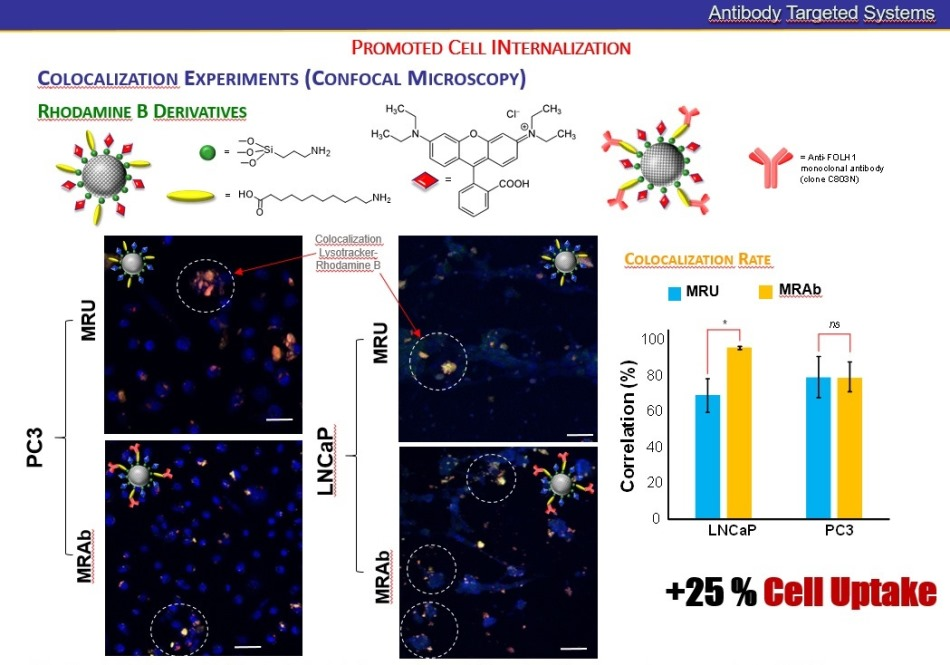Sep 16 2020
Prostate cancer is said to be the most common type of cancer that affects a majority of European men. Its incidence exceeds 100 cases per 100,000 individuals.
 Selective actuation of docetaxel nanomedicine. The incorporation into the theranostic system of an anti-FOLH1 monoclonal antibody promotes entry into cancer cells with FOLH1 receptors (LNCaP). Cell internalization is 25% in LNCaP with respect to PC3 cells without these receptors. Image Credit: Asociación RUVID.
Selective actuation of docetaxel nanomedicine. The incorporation into the theranostic system of an anti-FOLH1 monoclonal antibody promotes entry into cancer cells with FOLH1 receptors (LNCaP). Cell internalization is 25% in LNCaP with respect to PC3 cells without these receptors. Image Credit: Asociación RUVID.
At present, prostate cancer is also the second most common cause of death among men.
Scientists from the Institute of Chemical Technology (ITQ), a mixed center of the Polytechnic University of Valencia (UPV) and the Spanish National Research Council (CSIC) have now produced and patented a novel nanomedicine (theranostic system) for diagnosing and treating prostate cancer.
The theranostic nanomedicine is based on the use of organic porous nanoparticles, known as covalent organic frameworks (COFs), which stand out for being less aggressive and more efficient than standard chemotherapy.
Through certain interactions between antigens and antibodies, the nanomedicine allows selective destruction of tumor cells present in the local lymph nodes and the prostate gland. It includes a COF nanoparticle that contains a therapeutic agent—in this example docetaxel, the most oft-used drug meant for treating prostate cancer that is impervious to hormonotherapy—an anti-FOLH1 monoclonal antibody, which selectively communicates with the FOLH1 membrane receptors of the prostate cancer cells, and also an imaging agent, which is usually a radionuclide for positron emission tomography (PET).
Intra-Tumor Administration
The administration procedure of the new theranostic nanomedicine is also a major breakthrough because it is injected in an intra-tumor manner.
This approach reduces its impact on the rest of the body, minimizing the secondary effects of the docetaxel drug. It also overcomes the toxicity problems caused by the intravenous administration of the docetaxel drug, the high systemic toxicity of which restricts both the duration and the doses of the therapy. This, in turn, considerably minimizes its anti-tumor efficiency.
With our nanomedicine, the required dose is lower than in conventional chemotherapy, and its therapeutic effect is greater. In the in-vitro studies on prostate cancer cells, the system has managed to improve the anti-tumour activity of docetaxel by a factor of 15.
Pablo Botella, Scientist, Institute of Chemical Technology, Spanish National Research Council
Other Advantages
The novel theranostic system also allows simultaneous detection of tumor cells and their destruction, which helps track the evolution of cancer as well as the specificity of the treatment at the same time.
All this is possible because of the use of a molecule that directs it to certain receptors in the tumor cells and the use of the PET imaging method, which helps spot the malignant tissue present in the prostate gland with excellent precision. This makes it easy to diagnose the disease in its initial stages.
In addition, the discharge of the therapeutic agent can be tracked for a number of hours or even days. The nanoparticle is also fully organic, and completely biodegradable (unlike others of a hybrid or inorganic nature), which helps dispose of it completely.
Source: https://ruvid.org/